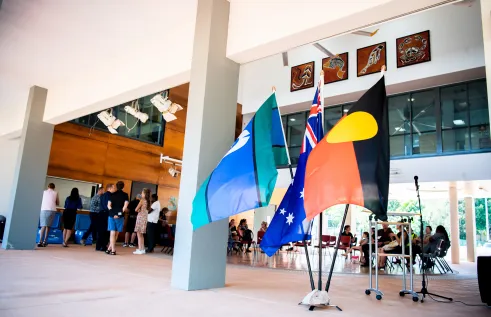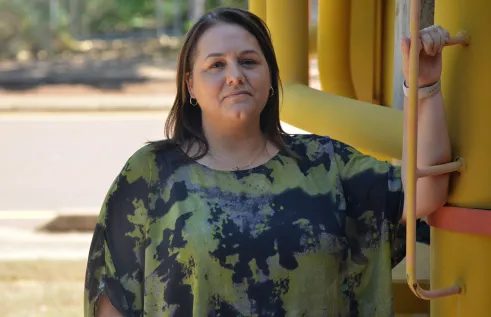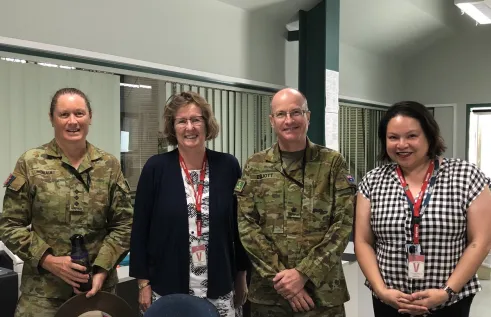Future study
Why an Arts degree is worth studying

Is an Arts degree worth it? If this is a question you're asking yourself, read on to see why an arts degree is still absolutely worth the investment.
“Arts brings together the skills you need to be adaptable, creative and a critical thinker and that’s what you need in your future career,” says Professor Ruth Wallace, Pro Vice-Chancellor at CDU’s Faculty of Arts and Society.
"Arts graduates are an important part of what the future workforce needs.”
Research and predictions from the World Economic Forum have shown that soft, transferable skills (such as creativity, diversity and cultural intelligence) will, in fact, be most in demand for jobs of the future. And if predictions are right, Deloitte Access Economics says you can expect the proportion of jobs requiring these skills to rise to 63 percent by 2030.
That’s not to say that a degree in health, education, science or technology – or any other area – is more or less important.
“STEM skills and the like undoubtedly have a place in the future of work. But, so do the skills that underpin Arts programs,” says Professor Wallace.
In all industries, there is a need for staff members, leaders and decision-makers who hold exactly the kind of creative, communication, and emotional and cultural intelligence skills that are the crux of Art programs. In fact, a significant number of Australia’s ministers hold degrees in the Arts.
Fresh perspectives when we need them most
We don’t have to look far to see that representation of a range of voices and cultures is needed in Australia and across the globe.
And it’s Arts’ graduates that can help to foster, encourage and amplify those voices. “One of the core roles of an Arts degree is to explore different cultures and ways of thinking,” says Professor Wallace.
“Our society is always going to be dependent on people from other cultures and other places, and we are going to live in a world that expects greater equality. The people who can articulate that will play an important part of the employment landscape, well into the future.”
That’s why the Arts programs at CDU offer a range of opportunities to learn from cultural thought-leaders on Indigenous Australia and South-East Asia.
“Students may do overseas study tours and participate in on-country experiences led by Aboriginal people, where students put what they’ve learned into practice,” explains Professor Wallace.
“One of the reasons that learning about Indigenous perspectives is important is because it gets people to see things from a completely different angle and prepares them to be able to respond to unexpected situations.”
“Students also complete core units that specifically focus on the social, cultural and economic landscape of Northern Australia and its Indigenous people. This builds their cultural competence, creative thinking, and an understanding of our history and place in the world,” says Professor Wallace.
The ability to adapt during uncertainty
If there’s one thing we’ve learned this year, it’s that nothing is certain.
“An Arts degree equips students with different perspectives to strengthen their ability to cope with uncertainty, because that’s going to be the future of work for everybody.
"There is merit in studying something that’s broad and flexible enough to adapt to the way jobs will change,” says Professor Wallace.
“The Arts courses at CDU are flexible and adaptable, with the option to choose from a wide range of both practical and specialised majors or study themes. We encourage students to ask about how a program can be tailored to fit their interests and career goals. Don’t be afraid to ask that question.”
“If you learn technical skills or gain knowledge from another area of study, consider options to combine different disciplines through dual degrees, add a diploma or certificate, or take units from another faculty as part of your degree,” says Professor Wallace.
Students also benefit from close ties to a range of important research initiatives through CDU’s Northern Institute and D-Labs for the Arts, Indigenous knowledges, and vulnerable environments.
Demonstrate that you’re employable
The key to success for Arts’ students is demonstrating how your Arts degree makes you a valuable employee. Not all Arts degrees are created equal.
“Make sure you choose an Arts degree that gives you the opportunity to get industry experience - either on a research project or a work-integrated learning project," says Professor Wallace.
"This shows you can apply the knowledge and skills that you have learnt.
“Develop a portfolio of real-world experience to show to future employers and consider taking a few units or subjects that have highly tangible outcomes (such as languages or design),” says Professor Wallace.
The Arts courses at CDU offer the opportunity for professional practice, which for many CDU Arts graduates has translated into meaningful employment. Many are now building successful careers in a range of areas, including Indigenous policy and governance, large government projects, corporate communications and marketing, journalism, and architecture.
Explore CDU’s Art courses and choose from a wide range of specialisations.
Image courtesy of Tourism NT/Archie Sartracom
Related Articles

Seeking answers to low numbers of First Nations women in mining
CDU Researcher PhD candidate Jodi Cowdery investigates the low number of First Nations women working in the Northern Territory mining industry. The mining industry has long been populated by non-First Nations men from outside of the nearby communities.
Read more about Seeking answers to low numbers of First Nations women in mining
Are peace and democracy worth dying for?
We have all seen the images of war on our television screens. What happens when, inevitably, the guns fall silent and the blades are returned to their sheaths? When the red mist recedes, and some form of non-violent rationality raises its weary head above the bloodied parapets.
Read more about Are peace and democracy worth dying for?
Hannah is researching military vets who attend uni
At first, Australian Air Force veteran Hannah Taino-Spick didn’t think she was eligible to do a research degree. Thanks to a supportive professor at Charles Darwin University, however, Hannah is now pursuing a PhD via a Higher Degree by Research (HDR).
Read more about Hannah is researching military vets who attend uni